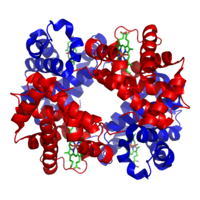
Photo from wikipedia
Alpha thalassemia is a hemoglobinopathy due to decreased production of the α‐globin protein from loss of up to four α‐globin genes, with one or two missing in the trait phenotype.… Click to show full abstract
Alpha thalassemia is a hemoglobinopathy due to decreased production of the α‐globin protein from loss of up to four α‐globin genes, with one or two missing in the trait phenotype. Individuals with sickle cell disease who co‐inherit the loss of one or two α‐globin genes have been known to have reduced risk of morbid outcomes, but the underlying mechanism is unknown. While α‐globin gene deletions affect sickle red cell deformability, the α‐globin genes and protein are also present in the endothelial wall of human arterioles and participate in nitric oxide scavenging during vasoconstriction. Decreased production of α‐globin due to α‐thalassemia trait may thereby limit nitric oxide scavenging and promote vasodilation. To evaluate this potential mechanism, we performed flow‐mediated dilation and microvascular post‐occlusive reactive hyperemia in 27 human subjects (15 missing one or two α‐globin genes and 12 healthy controls). Flow‐mediated dilation was significantly higher in subjects with α‐trait after controlling for age (P = .0357), but microvascular perfusion was not different between groups. As none of the subjects had anemia or hemolysis, the improvement in vascular function could be attributed to the difference in α‐globin gene status. This may explain the beneficial effect of α‐globin gene loss in sickle cell disease and suggests that α‐globin gene status may play a role in other vascular diseases.
Journal Title: American Journal of Hematology
Year Published: 2020
Link to full text (if available)
Share on Social Media: Sign Up to like & get
recommendations!